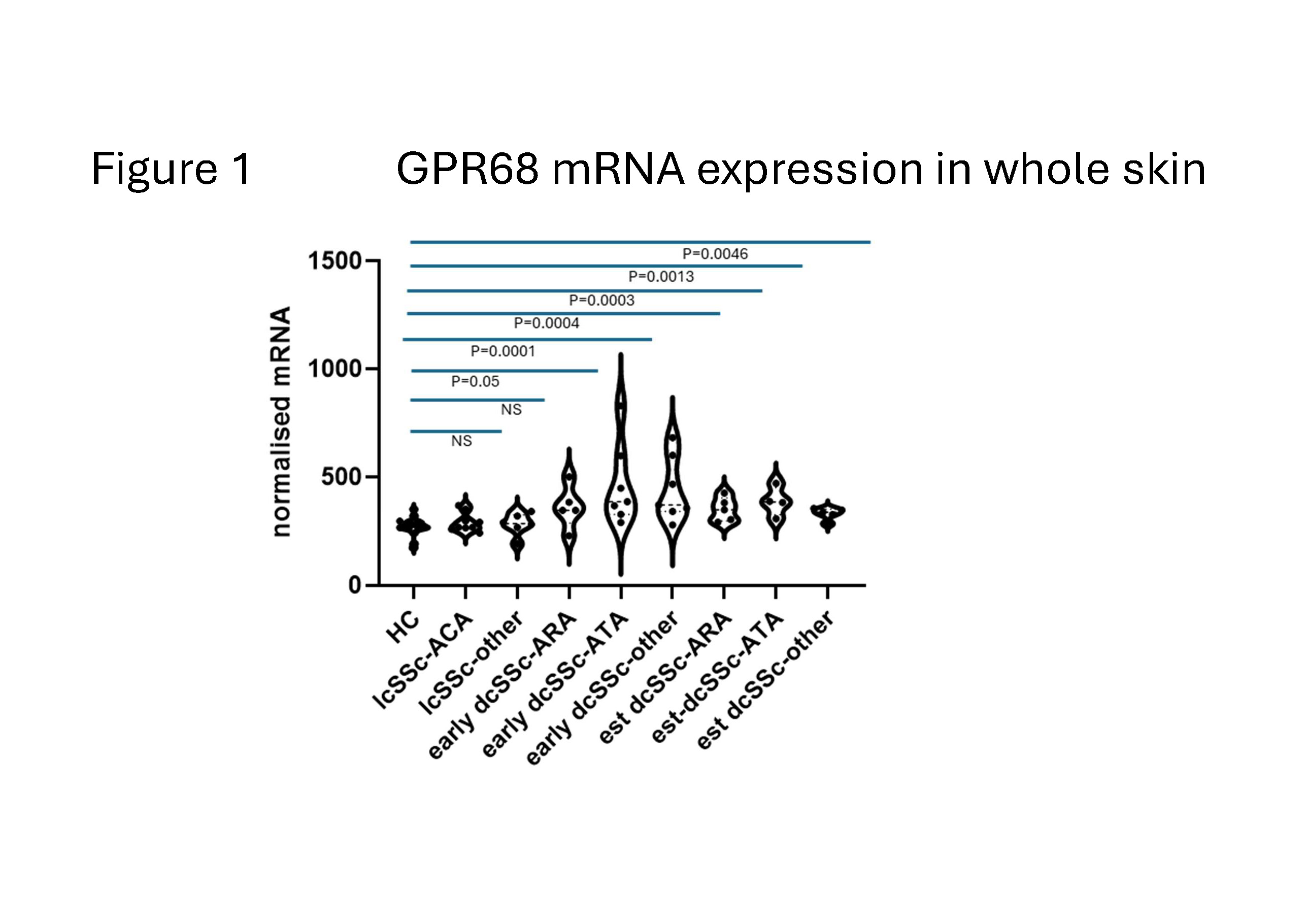Session Information
Date: Monday, October 27, 2025
Title: (0955–0977) Systemic Sclerosis & Related Disorders – Basic Science Poster I
Session Type: Poster Session B
Session Time: 10:30AM-12:30PM
Background/Purpose: The cell surface protein GPR68 (ovarian cancer G protein-coupled receptor 1, OGR1) is a proton-sensing G-protein-coupled receptor (GPCR) that responds to extracellular acidity and regulates a variety of cellular functions. It has been associated with fibrosis and a recent phase 2 clinical trial of FT011 (asengeprast), an orally active small molecule inhibitor GPR68 suggested potential clinical benefit in diffuse cutaneous (dc) systemic sclerosis (SSc). We have explored differential expression of GPR68 in SSc skin and in pathogenic skin fibroblast subpopulations.
Methods: Normalised expression of GPR68 mRNA was explored in a well characterised cohort of SSc and control skin biopsies (n=68) comparing SSc stage, skin autoantibody and subset (ATA=anti-topoisomerase-1; ARA=anti-RNA polymerase 3; ACA=anti-centromere). Protein and RNA expression were examined in cultured SSc or control skin fibroblasts including migratory and non-migratory cells (n=3 each). Non-migratory “resident” fibroblasts have recently been characterised as a novel population strongly implicated in pathogenesis of SSc. Single cell analysis was used to further define GPR68 expression in fibroblasts and other cell types in SSc (n=12) and control (n=3) skin.
Results: There was increased expression of GPR68 RNA in skin of SSc that was most apparent in dcSSc (mean (SD) HC 268 (41) n=17; lcSSc 286 (45) n=15; dcSSc 396 (126) n=33). Further analysis suggested upregulation was greater in early (428 (153) n=19) than established (353 (53) n=14) dcSSc. ANA subgroups also showed differential elevation of GPR68 with highest levels in ATA+ dcSSc (436 (157) n=11), lower levels in ARA+ dcSSc (355 (75) n=10). Differential expression across subgroups is summarised in Figure 1.GPR68 protein and mRNA were increased in cultured SSc dermal fibroblasts and highest in non-migratory cells in SSc compared with healthy control strains in bulk fibroblast culture (Figure 2). Single cell RNA analysis of skin confirmed expression of GPR68 in multiple relevant cell types including fibroblasts, endothelial cells, macrophages and T cells. Re-clustered fibroblast scRNAseq data suggested stage and ANA subset differences concordant with bulk RNAseq (Figure 3). Notably, GPR68 had greatest single cell expression in migratory fibroblasts for ARA+ and resident fibroblasts in ATA+ dcSSc skin suggesting differences across ANA subgroups.
Conclusion: We have demonstrated upregulation of GPR68 in SSc and increased expression in pathogenic fibroblast populations including the recently identified non-migratory “resident” fibroblast subpopulation that may be a key paracrine regulator of skin fibrosis. Our findings support the rationale for targeting GPR68 as a treatment for SSc fibrosis and help define the stage and subset of patients most likely to benefit from treatment.
 Figure 1 GPR68 mRNA expression in whole skin
Figure 1 GPR68 mRNA expression in whole skin
.jpg) Figure 2 Fibroblast GPR68 Expression
Figure 2 Fibroblast GPR68 Expression
.jpg) Figure 3 Whole skin scRNAseq analysis
Figure 3 Whole skin scRNAseq analysis
To cite this abstract in AMA style:
clark k, Shiwen X, Li X, Ong V, Denton C. Integrated Bulk and Single Cell Analysis Confirms Differential Upregulation of the Proton Sensing Receptor GPR68 in Systemic Sclerosis Across Disease Stage and Subset [abstract]. Arthritis Rheumatol. 2025; 77 (suppl 9). https://acrabstracts.org/abstract/integrated-bulk-and-single-cell-analysis-confirms-differential-upregulation-of-the-proton-sensing-receptor-gpr68-in-systemic-sclerosis-across-disease-stage-and-subset/. Accessed .« Back to ACR Convergence 2025
ACR Meeting Abstracts - https://acrabstracts.org/abstract/integrated-bulk-and-single-cell-analysis-confirms-differential-upregulation-of-the-proton-sensing-receptor-gpr68-in-systemic-sclerosis-across-disease-stage-and-subset/
